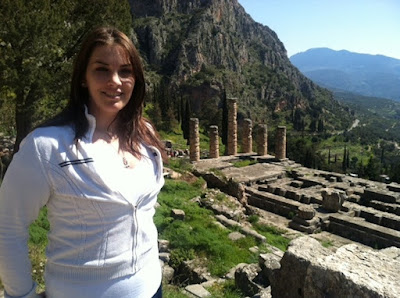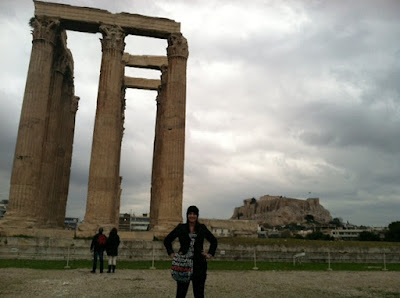After recently completing my Master’s degree at Brock University in June of 2014 and being in the process of applying to PhD programs, I was looking for a way to remain active within the Classics field. My professors in the Department of Classics at Brock University suggested the internship program at the Canadian Institute in Greece. This sounded like a wonderful opportunity and I promptly applied. I was thrilled when they offered me the opportunity and spent the fall preparing for my long stay in Athens, Greece.
I arrived in Athens on Sunday, January 10th, 2015 in the evening and rested from my long travel and began the internship the next day, Monday, January 11th, 2015. After a brief introduction to the Institute, I was put to work organizing and updating the library. My main tasks were to ensure that the monographs are in order properly based on their Library of Congress numbers and to make certain that all the information in the CIG’s catalogue matched the information on the monographs in the library. This was extensive work and took up the majority of my time here. I also couriered the CIG’s latest publication to various institutions around Athens, which proved to be a bit of an adventure when I found myself lost near the Victoria metro station.
In addition to my work in the library of the CIG, I attended various academic lectures at the British School, the American School, the French School, the Finnish Institute, and the Swedish Institute. This allowed me to remain up to date on some of the current research and projects in Greece and the Classics field, and to meet many different academics from different parts of the world. As a Roman historian primarily, I learned quite a bit about archaeological projects in Greece and some new and exciting interpretations of many ancient sites. I also visited a great majority of the museums in Athens and a majority of the sites. The most notable Athenian sites for me are the Acropolis, Olympeion, Plato’s Academy, Aristotle’s Lyceum, and the stadium. I also took part in the weekly gathering of academics at the famous Red Lion pub to play darts and socialize with various people. This was always a great opportunity to unwind and get to know people from the various institutions in Athens.In addition to my Athenian exploits, I attempted to travel as much as I was able outside of Athens. My first excursion was to Sounio where I visited the Temple of Poseidon. The atmosphere was absolutely stunning and the Temple was perfectly placed on a cliff overlooking the deep blue sea. The temple is in relatively good condition and well worth a visit! I next visited Delphi, one of if not the most important site of the ancient world. After visiting, I can see why it was so important and it truly is the perfect place for a massive sanctuary. The stadium, Athenian treasury, and Temple of Apollo are well preserved, generally, and the views from the sanctuary of the surrounding mountains are unparalleled. The Kastalian spring, sanctuary of Athena, and the museum are wonderful sites as well. During my travels I made sure to visit Aegina, a small island about 40-50 minutes by hydrofoil from Athens and very easy to get to. Visiting Aegina is a chance to experience the Greek islands without traveling too far from the city. There I visited the site of Kolonna and the temple of Aphaia which are situated with a perfect view of the sea and mountainsides. Finally, I visited Corinth, a necessity for a Roman historian in Greece. The site is not as impressive as Delphi, but the ruins are quite spectacular. The remains of shops and mosaics on the walls, as well as the forum and Temple of Apollo are quite impressive. Also, again the site is situated with a wonderful view of the mountains that surround it. Coming from Ohio, I am not often exposed to hills and mountains and the landscape of Greece is certainly that! A taste of this can be found on Lykavittos in Athens which provides a stunning view of Athens as far as the eye can see.
In addition to the landscape and the wonderful historical sites, I was most impressed with the large academic community within Athens. Every week throughout the year there are many academic events and lectures to keep those interested in ancient Greek and Roman history, archaeology, literature, and art satisfied. These events serve an educational function, but also allow people to meet other academics and people interested in Classics. The food in Greece and the culture is also marvelous and not at all what I’m used to in Ohio. I enjoy the relaxed, casual attitude of a majority of Greeks and the often personal way with which they treat everybody.
I am grateful to the Department of Classics at Brock University, without which I would not have had this opportunity, and the Canadian Institute in Greece for allowing me the opportunity to work and live here in Athens. This experience had added new skills to my repertoire and was a valuable opportunity to meet fellow academics and visit the sites I’ve read about all too often. Hopefully I will be starting my PhD this fall and will have the opportunity to return t Greece in the near future.
Tessa Little
Brock University graduate intern





No comments:
Post a Comment